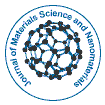当社グループは 3,000 以上の世界的なカンファレンスシリーズ 米国、ヨーロッパ、世界中で毎年イベントが開催されます。 1,000 のより科学的な学会からの支援を受けたアジア および 700 以上の オープン アクセスを発行ジャーナルには 50,000 人以上の著名人が掲載されており、科学者が編集委員として名高い
。オープンアクセスジャーナルはより多くの読者と引用を獲得
700 ジャーナル と 15,000,000 人の読者 各ジャーナルは 25,000 人以上の読者を獲得
抽象的な
Analysis as a Micro Fibrous Graft for Components in Synthetic Biology
Kyaw Myo Zaw
A biocompatible and biodegradable poly (1,4-butylene succinate) microfibrous tubular scaffold has been produced through the use of electrospinning.The scaffold’s morphology was N-optimized to prevent cell infiltration through the graft’s wall and to promote cell integration, adhesion, and growth as a micro-porous conduit with a small diameter.The scaffold’s mechanical properties and morphology were examined and compared to those of native conduits.Scaffolds were then seeded with adult normal human dermal fibroblasts to test cytocompatibility in vitro.The hemolytic effect was assessed following incubation with whole blood that had been diluted.The graft is able to provide initial mechanical support and functionality thanks to the demonstrated degradation profile during colonization and subsequent replacement by host cells. Elastic modulus (less than 17.5 1.6 MPa), ultimate tensile stress (less than 3.95 0.17 MPa), strain to failure (less than 57 4.5%), and suture retention force (less than 2.65 0.32 N) were all within the physiological range for tubular conduits. There was no delamination of the scaffold’s mechanical properties.This combination of properties may make it possible to use PBS as a biomaterial to create scaffolds that support host cell remodelling and provide structure and function over time.

 English
English  Spanish
Spanish  Chinese
Chinese  Russian
Russian  German
German  French
French  Portuguese
Portuguese  Hindi
Hindi